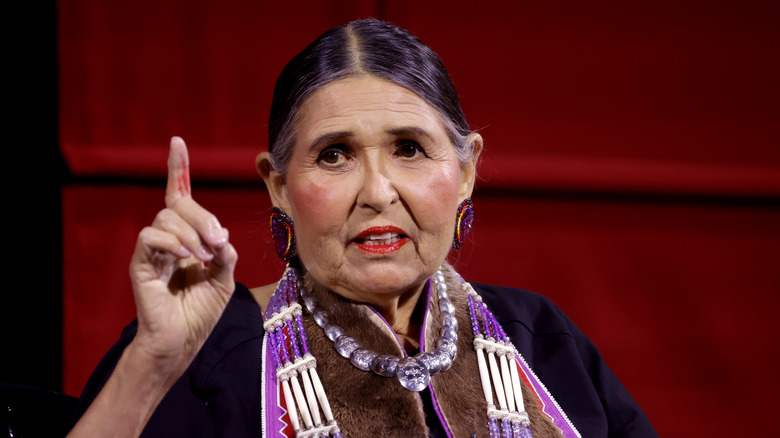Sacheen Littlefeather, The Activist Who Declined Marlon Brando's Godfather Oscar, Dies At 75
Sacheen Littlefeather, the actress and Native American civil rights activist known for refusing the Best Actor Oscar on behalf of Marlon Brando at the 45th Academy Awards, has died at the age of 75. The news comes just two months after reports that the Academy of Motion Picture Arts and Sciences had finally issued a long-overdue formal apology to Littlefeather for her treatment at the Oscars ceremony in 1973. The Academy itself announced the news of her death from breast cancer on Sunday, October 2, 2022 (via Variety).
Littlefeather was born Marie Louise Cruz to an Apache and Yaqui father and an American mother of European descent on November 14, 1946, in Salinas, California. Newsweek (per MSN) reports that she was raised by her grandparents and embarked on a modeling career after high school, studying dramatics and speech at California State University, East Bay, then known as California State College, Hayward. Her work as an activist included participating in the Occupation of Alcatraz in 1970, when Native American protesters occupied the prison island in an effort to reclaim the land and raise awareness of violations of the Treaty of Fort Laramie.
Though she later appeared as herself in documentaries, including "Sacheen: Breaking the Silence" in 2021, Littlefeather faced blacklisting after the Oscars incident (see below). As a result, she had just seven acting credits to her name, spanning a five-year period from 1973 to 1978, according to IMDb. She first made a cameo in "Counselor at Crime," before appearing uncredited in minor roles in "The Laughing Policeman" and "Freebie and the Bean." In "The Trial of Billyjack," she played Patsy Littlejohn, and in "Johnny Firecloud," she played Nenya. Her final two roles were in "Winterhawk" and "Shoot the Sun Down."
A speech that defined a life
Littlefeather's appearance on stage at the Oscars, where she declined Brando's award for "The Godfather," stirred controversy at the time, even though she addressed the audience in respectful terms as the president of the National Native American Affirmative Image Committee. Her 60-second speech, winnowed down from Brando's eight-page written version and delivered on the threat of arrest, was met with a mixture of boos and applause. As she explained onstage, it was meant to protest "the treatment of American Indians" by the film industry.
Fifty years later — with "The Godfather" celebrating the golden anniversary of its opening line, "I believe in America," in 2022 — Littlefeather recalled to A.frame, the Academy's digital magazine, how John Wayne almost rushed the stage during her Oscars moment and how she was met with mocking tomahawk chops and literally shot at after leaving the ceremony. Yet she had no regrets about making a political statement while the Wounded Knee Occupation was going unreported in a news media blackout at the time.
As recently as this year, Littlefeather ruminated on death, saying:
"When we die, we know that our ancestors are coming to give. We know that we're going to that spirit world from where we came. We take this as a warrior with pride and not defeat, looking forward to joining our ancestors who are going to be there with us at our last breath and they're going to welcome us into that world on the other side and have a big celebration for us."
With Indigenous actors gaining increased visibility of late in TV shows and movies like "Rutherford Falls," "Reservation Dogs," "Dark Winds," and "Prey," the big and small screen continue to celebrate Littlefeather's life and the legacy of personal sacrifice she left behind with her activism.
